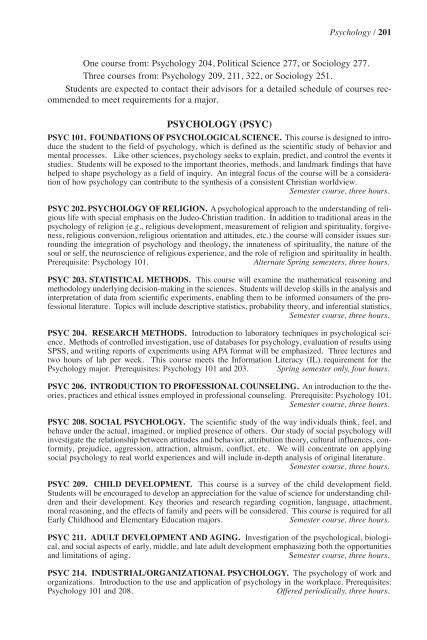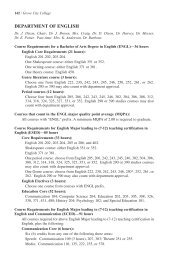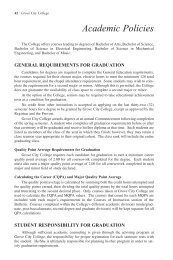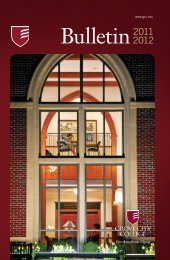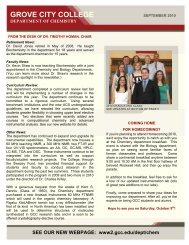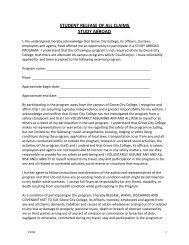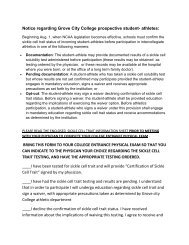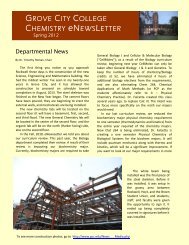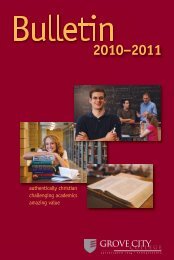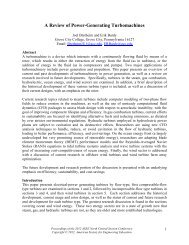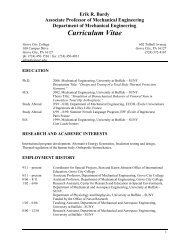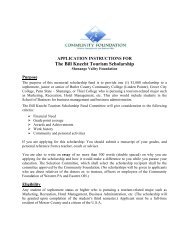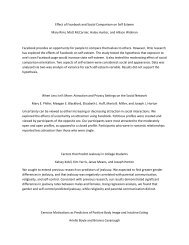2009–2010 - Grove City College
2009–2010 - Grove City College
2009–2010 - Grove City College
Create successful ePaper yourself
Turn your PDF publications into a flip-book with our unique Google optimized e-Paper software.
Psychology / 201<br />
One course from: Psychology 204, Political Science 277, or Sociology 277.<br />
Three courses from: Psychology 209, 211, 322, or Sociology 251.<br />
Students are expected to contact their advisors for a detailed schedule of courses recommended<br />
to meet requirements for a major.<br />
PSYCHOLOGY (PSYC)<br />
PSYC 101. FOUNDATIONS OF PSYCHOLOGICAL SCIENCE. This course is designed to introduce<br />
the student to the field of psychology, which is defined as the scientific study of behavior and<br />
mental processes. Like other sciences, psychology seeks to explain, predict, and control the events it<br />
studies. Students will be exposed to the important theories, methods, and landmark findings that have<br />
helped to shape psychology as a field of inquiry. An integral focus of the course will be a consideration<br />
of how psychology can contribute to the synthesis of a consistent Christian worldview.<br />
Semester course, three hours.<br />
PSYC 202. PSYCHOLOGY OF RELIGION. A psychological approach to the understanding of religious<br />
life with special emphasis on the Judeo-Christian tradition. In addition to traditional areas in the<br />
psychology of religion (e.g., religious development, measurement of religion and spirituality, forgiveness,<br />
religious conversion, religious orientation and attitudes, etc.) the course will consider issues surrounding<br />
the integration of psychology and theology, the innateness of spirituality, the nature of the<br />
soul or self, the neuroscience of religious experience, and the role of religion and spirituality in health.<br />
Prerequisite: Psychology 101. Alternate Spring semesters, three hours.<br />
PSYC 203. STATISTICAL METHODS. This course will examine the mathematical reasoning and<br />
methodology underlying decision-making in the sciences. Students will develop skills in the analysis and<br />
interpretation of data from scientific experiments, enabling them to be informed consumers of the professional<br />
literature. Topics will include descriptive statistics, probability theory, and inferential statistics.<br />
Semester course, three hours.<br />
PSYC 204. RESEARCH METHODS. Introduction to laboratory techniques in psychological science.<br />
Methods of controlled investigation, use of databases for psychology, evaluation of results using<br />
SPSS, and writing reports of experiments using APA format will be emphasized. Three lectures and<br />
two hours of lab per week. This course meets the Information Literacy (IL) requirement for the<br />
Psychology major. Prerequisites: Psychology 101 and 203. Spring semester only, four hours.<br />
PSYC 206. INTRODUCTION TO PROFESSIONAL COUNSELING. An introduction to the theories,<br />
practices and ethical issues employed in professional counseling. Prerequisite: Psychology 101.<br />
Semester course, three hours.<br />
PSYC 208. SOCIAL PSYCHOLOGY. The scientific study of the way individuals think, feel, and<br />
behave under the actual, imagined, or implied presence of others. Our study of social psychology will<br />
investigate the relationship between attitudes and behavior, attribution theory, cultural influences, conformity,<br />
prejudice, aggression, attraction, altruism, conflict, etc. We will concentrate on applying<br />
social psychology to real world experiences and will include in-depth analysis of original literature.<br />
Semester course, three hours.<br />
PSYC 209. CHILD DEVELOPMENT. This course is a survey of the child development field.<br />
Students will be encouraged to develop an appreciation for the value of science for understanding children<br />
and their development. Key theories and research regarding cognition, language, attachment,<br />
moral reasoning, and the effects of family and peers will be considered. This course is required for all<br />
Early Childhood and Elementary Education majors. Semester course, three hours.<br />
PSYC 211. ADULT DEVELOPMENT AND AGING. Investigation of the psychological, biological,<br />
and social aspects of early, middle, and late adult development emphasizing both the opportunities<br />
and limitations of aging. Semester course, three hours.<br />
PSYC 214. INDUSTRIAL/ORGANIZATIONAL PSYCHOLOGY. The psychology of work and<br />
organizations. Introduction to the use and application of psychology in the workplace. Prerequisites:<br />
Psychology 101 and 208. Offered periodically, three hours.


